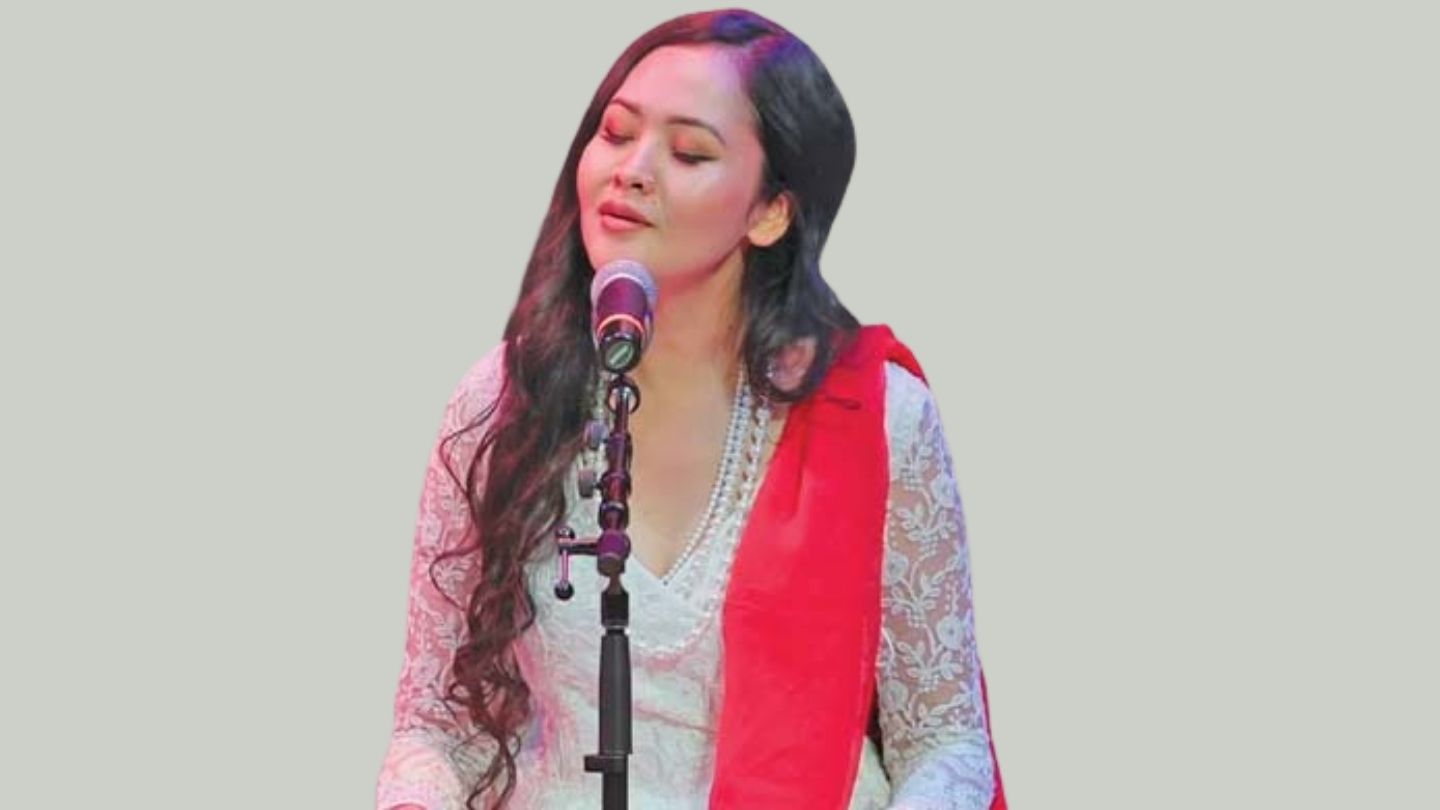
Saraswati Khatri Finds Her Place in Classical Music
A strong base in classical music, the ability to sing in 18 languages and regular performances on international stages have made Saraswati Khatri a familiar name in Nepali classical music.
For nearly a decade, she has been associated with the Sur-Sudha musical group. Her presentation of the bhajan “Vaishnav Jan To” placed her among a few Nepali artists who have received direct appreciation from Indian Prime Minister Narendra Modi. Khatri sees music as a path that demands discipline, commitment and originality.
In a conversation with Gorkhapatra, she shared how her journey started, how she entered Sur-Sudha, why she sings in many languages and how she views the future of classical music.
From Classroom Training to the Sur-Sudha Stage
Khatri did not arrive at classical music overnight. She first studied with Balram Rajbanshi for about a year, learning the basics and understanding the structure of classical singing. After that, she trained for around four years under Chandi Kafle, which helped her deepen her voice control and grasp of raga-based music.
She then enrolled at Padma Kanya Campus and completed a four-year bachelor’s degree in classical music. Alongside formal study, she continued to look for spaces where she could keep learning and performing.
About 10 years ago, she approached Sur-Sudha. Before joining, founder Surendra Shrestha took her vocal test. Rather than putting her straight on stage, he kept her under his guidance for almost four to five years. Only after this long period of training, correction and rehearsal did the group finally include her as a regular performer. For Khatri, this gradual process confirmed her belief that classical music is built on steady practice, not shortcuts.
A Voice That Travels Across 18 Languages
One of the striking features of Khatri’s work is her comfort in many languages. She says the idea did not come from her alone; it grew from Surendra Shrestha’s encouragement and the group’s experience abroad.
Before singing in a new language, she spends time learning the correct pronunciation, the meaning of key words and the general style. She pays special attention to how the language sits in the mouth and how it shapes the melody.
During Sur-Sudha’s international tours, audiences often ask for songs in their own language. When listeners hear familiar words from a Nepali group, they respond with warmth and curiosity. This reaction motivated her to keep expanding her range.
So far, Khatri has sung in 18 languages, including Russian, Sri Lankan, Bangla, Japanese, Arabic, Chinese, Vietnamese, Turkish, Omani, Korean, Hindi, English, Gujarati and Nepali. For her, each language is not just a technical challenge but also a way to respect the people who come to listen.
When “Vaishnav Jan” Drew a Prime Minister’s Attention
Among her many performances, Khatri clearly remembers the moments linked with Indian Prime Minister Narendra Modi. She recalls how he came directly to the performance area, setting aside protocol, to ask about a Gujarati folk song she had sung.
He praised her performance on stage in Kathmandu in 2018 and again in Lumbini in 2022. For Khatri, such public recognition from the leader of a neighbouring country is a rare honour for any artist.
After listening to “Vaishnav Jan,” Modi also mentioned both Sur-Sudha and Khatri by name in a tweet. He wrote that hearing Mahatma Gandhi’s favourite bhajan “Vaishnav Jan” in her melodious voice brought back memories of his visit to Nepal, and he highlighted the line “Pir Parai Jaane Re” as a reflection of values shared by India and Nepal.
Khatri takes this as encouragement, but also as a reminder that devotional and classical music can quietly carry shared values across borders without loud statements.
Classical Music as Work, Practice and Inner Choice
For Khatri, classical music is not something she does on the side. She links it closely with her personal growth. Years of riyaz have shaped how she listens, speaks and reacts, not only on stage but in daily life.
She says classical music has given her a way to express emotions with more depth and control. The repeated practice of notes, compositions and improvisations has taught her patience and steadiness. Because of this, she sees classical music as both an inner choice and a long-term commitment.
On the question of livelihood, she is realistic but hopeful. She notes that in many countries, people have been earning their living from classical music and bhajans for generations. In Nepal too, she feels that the space for this kind of work is slowly growing.
According to her, the key is to understand the time and the audience. If an artist can present classical and devotional music in a way that is honest, well-prepared and sensitive to listeners, then stable work, opportunities and respect are all possible.
Standing Out in a Crowded Music Scene
Khatri is aware that the music scene has become crowded. New songs, genres and platforms appear every day, and attention moves quickly. But she does not believe that serious artists are bound to be lost in this flow.
She feels that the real risk comes when an artist abandons practice, forgets their own identity or tries too hard to copy others. In contrast, those who continue to refine their skills, stay clear about who they are and work on their own sound can still find space, even in a busy market.
In her view, competition is not only a threat; it can also be a mirror. It pushes artists to prepare better, to be more sincere and to rely on their own originality instead of instant trends.
For Saraswati Khatri, that is where her focus remains: on daily practice, on honest performance and on carrying a classical voice that can speak gently, but clearly, to listeners in Nepal and beyond.


